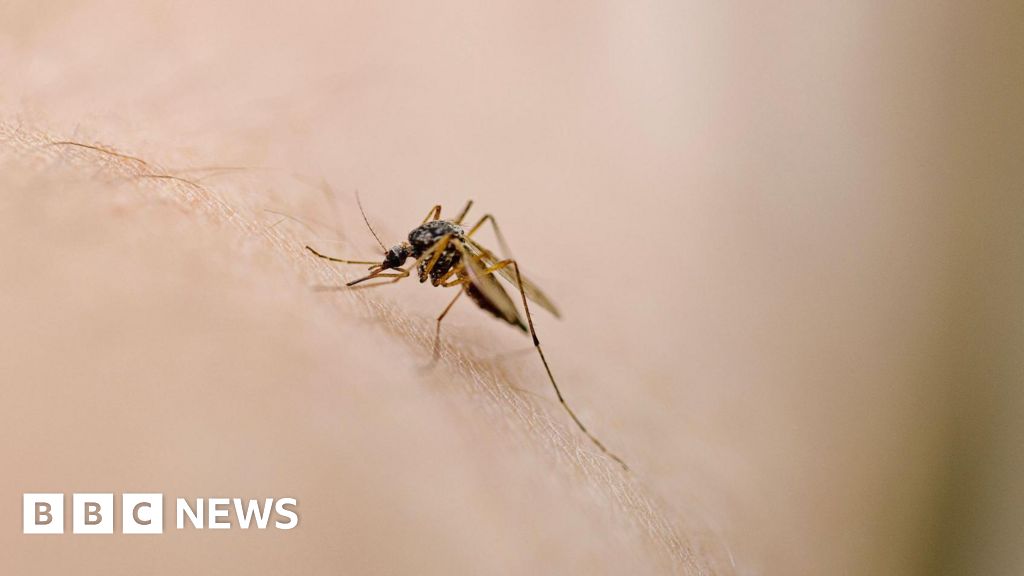Fragments of West Nile virus have been detected in UK mosquitoes for the first time, the UK Health Security Agency (UKHSA) said. A research programme by the UKHSA and the Animal and Plant Health Agency (APHA) found the genetic material in mosquitoes collected in Britain in 2023. West Nile virus is a vector borne disease usually found in birds that typically circulates through bird-biting mosquitoes. In rare cases, mosquitoes can transmit the virus to humans. A UKHSA spokesman said the risk to the general public is "very low" but advice to healthcare professionals will be issued.
West Nile virus detected in UK mosquitoes for first time
TruthLens AI Suggested Headline:
"UK Health Security Agency Reports Detection of West Nile Virus in Mosquitoes"
TruthLens AI Summary
For the first time, the UK Health Security Agency (UKHSA) has detected fragments of the West Nile virus in mosquitoes collected in the UK. This discovery was made through a research program conducted in collaboration with the Animal and Plant Health Agency (APHA). The genetic material of the virus was identified in mosquitoes sampled in 2023, marking a significant moment in the monitoring of vector-borne diseases within the region. The West Nile virus primarily circulates among birds and is transmitted through bird-biting mosquitoes. Although the virus is predominantly an avian disease, it can occasionally infect humans through mosquito bites, leading to potential health risks.
Despite this detection, the UKHSA has reassured the public that the risk of widespread transmission remains very low. A spokesperson from the agency emphasized that there is no immediate cause for concern among the general population. To ensure public safety, the UKHSA plans to issue guidance to healthcare professionals regarding the findings and potential implications of the virus's presence in local mosquito populations. This proactive approach aims to prepare healthcare providers to monitor and respond to any potential cases should they arise, while also continuing to assess the overall risk associated with the West Nile virus in the UK.
TruthLens AI Analysis
The detection of West Nile virus fragments in UK mosquitoes marks a significant development in public health monitoring. This news is crucial, as it raises awareness about emerging infectious diseases and their potential risks to human health. The UK Health Security Agency (UKHSA) reported the findings from a research program, which may serve multiple purposes, including informing the public and healthcare professionals about new threats.
Public Perception and Awareness
The article aims to foster awareness about the presence of West Nile virus in the UK, emphasizing the importance of vigilance regarding vector-borne diseases. By stating that the risk to the general public is "very low," the UKHSA seeks to alleviate panic while still encouraging precautionary measures. This dual approach can help in managing public perception, promoting both awareness and calmness.
Potential Omissions or Concerns
While the article reassures the public about the low risk, it may also be seen as downplaying potential future risks. By focusing on the current low risk, the article may inadvertently encourage complacency regarding vector-borne diseases, which could be misleading if the virus spreads or if conditions change.
Manipulative Elements
In terms of manipulation, the language used is carefully chosen to avoid inciting fear while still informing the public. The use of phrases like "very low risk" can create a sense of security, which might divert attention from the importance of ongoing monitoring and preventive measures. This could be perceived as a subtle attempt to manage public anxiety without fully addressing the potential implications of the virus's presence.
Comparative Context
When compared to other health-related news articles, this one aligns with a broader trend of increasing awareness about infectious diseases exacerbated by climate change and globalization. The emergence of such diseases in non-endemic regions is becoming more common, and this article taps into that narrative, linking local health concerns to global health challenges.
Impact on Society, Economy, and Politics
The implications of this news are multifaceted. On a societal level, it may prompt individuals to take more preventive health measures, such as using mosquito repellent. Economically, if the virus becomes more widespread, there may be increased healthcare costs and impacts on sectors like tourism. Politically, this could lead to calls for more robust public health policies or funding for research on vector-borne diseases.
Target Audiences
Communities that prioritize health and safety, including parents, health professionals, and outdoor enthusiasts, may find this news particularly relevant. The article seeks to reach an audience that is health-conscious and proactive about potential risks.
Market and Economic Effects
In terms of market impact, this news may influence stocks related to healthcare, pharmaceuticals, and pest control industries. Companies that develop mosquito repellents or manage public health initiatives may see increased interest or stock activity as awareness rises.
Geopolitical Relevance
From a geopolitical standpoint, the emergence of infectious diseases can shift the focus of health policies and international collaboration on public health issues. This news could contribute to broader discussions on global health security, especially in light of recent pandemics.
Artificial Intelligence Involvement
It is possible that AI tools were used in drafting this article, particularly in analyzing data trends related to the virus. Such models might have influenced the language and presentation of risks, steering the narrative towards reassurance while emphasizing the findings.
In conclusion, the reliability of the news hinges on the credibility of the sources and the transparency of the information presented. Given the involvement of recognized health agencies and the clear communication of risk levels, the article appears to be a trustworthy source, albeit with a potential bias towards minimizing public concern.
